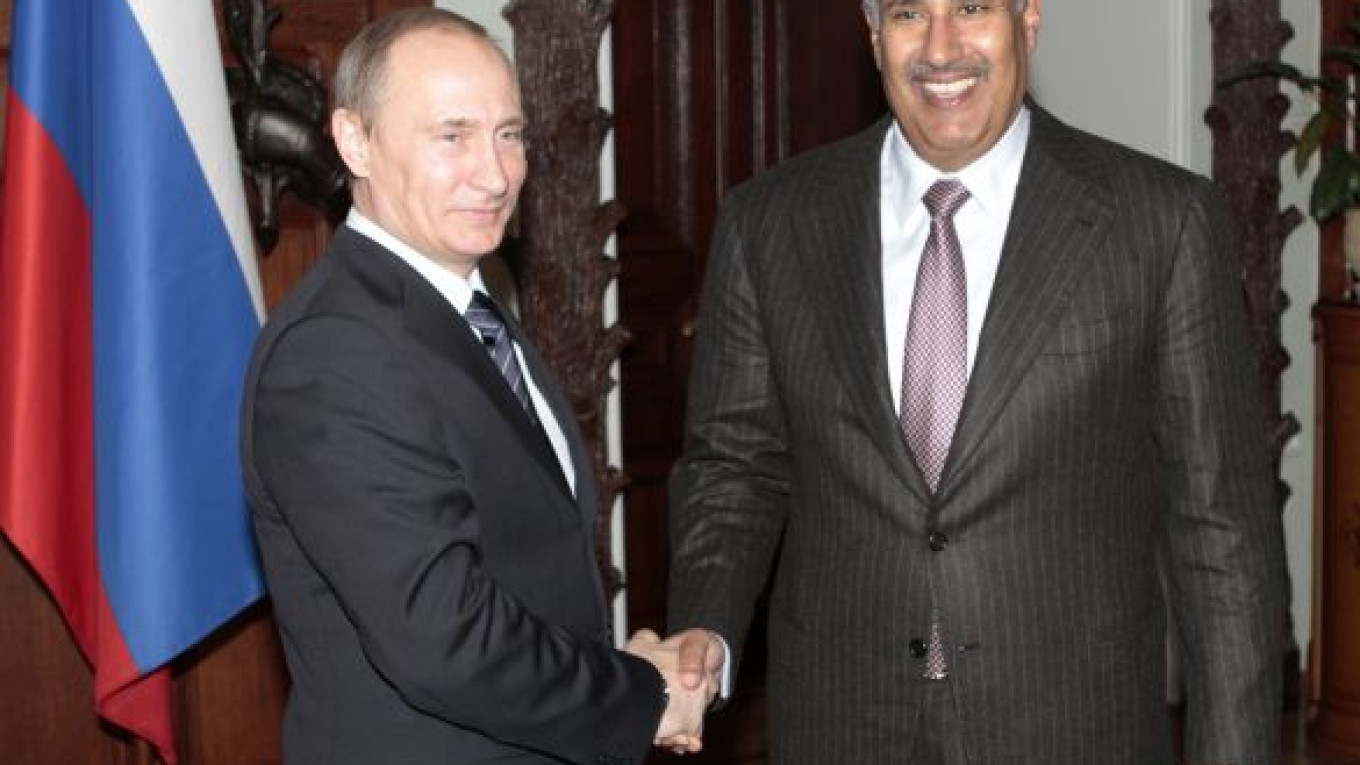Prime Minister Vladimir Putin stressed the need to coordinate the global gas trade on Wednesday after a meeting with his counterpart from Qatar, a country that has badly dented Gazprom's market share in Europe in recent months.
"It is in the interests of both Russia and Qatar to have a close coordination on global markets," Putin said. "First of all, this, of course, concerns the gas area."
He added that he hoped the Gas Exporting Countries Forum, which will convene next month, would act as an "efficient" tool to steer major gas-rich countries toward joint policies.
Qatar, an exporter of liquefied natural gas, or LNG, rerouted much of its deliveries from the United States to Europe, starting last year, as many other suppliers did.
They reacted to a contraction of demand for outside gas in the biggest energy consumer because U.S. companies — using a new technology — began producing large amounts of shale gas, which was previously too expensive to extract.
European spot prices collapsed, making Gazprom's exports less competitive.
Qatari Prime Minister Sheikh Hamad Bin Jassim Jabr Al-Thani simply acknowledged the fact that he discussed the gas trade with Putin. He did not elaborate on the issue as the two leaders came out for a statement for the press. They did not take questions.
Al-Thani held separate talks with Gazprom chief executive Alexei Miller earlier in the day, expressing interest in joining forces with Gazprom in developing the huge reserves on the Yamal Peninsula, an effort that would involve construction of an LNG plant there, the company said in a statement.
If it takes a stake in the Yamal development project, Qatar could possibly take more care to safeguard Russia's exports. Qatar holds the world's third-largest gas reserves, after Russia and Iran.
Miller and Al-Thani also discussed the Gas Exporters Countries Forum, the statement said. The Qatar-based forum, whose executive director is Russian, will meet in the Algerian city of Oran on April 19 with an agenda of stabilizing global gas markets and preventing price rivalry among producers, the Kremlin said in a statement Wednesday.
The forum — dubbed the Gas OPEC by the media — has failed to live up to early fears among gas consumers that it would attempt to move prices in the same fashion as the Organization of the Petroleum Exporting Countries.
Alexander Nazarov, an analyst at investment company Metropol, said Gazprom would continue to cede its market share to Qatar because the country has a more flexible pricing policy, despite whatever discussions are had at the forum.
"I don't see how this organization will achieve a significant and positive decision," he said. "It's a project that was born dead."
In other news from the talks, the government said Gazprom was evaluating Block D of Qatar's North Field, which the country is going to sell at a tender. Gazprom could bid for the right to develop the gas reserves as part of a consortium, according to press materials that the Cabinet press officials distributed before the prime ministers met. The papers gave no further details on the possible deal.
Gazprom maintains its interest in working with Qatar in other Middle Eastern countries to explore and develop reserves, build pipelines and process gas, including liquefying it to transport by tankers.
A Message from The Moscow Times:
Dear readers,
We are facing unprecedented challenges. Russia's Prosecutor General's Office has designated The Moscow Times as an "undesirable" organization, criminalizing our work and putting our staff at risk of prosecution. This follows our earlier unjust labeling as a "foreign agent."
These actions are direct attempts to silence independent journalism in Russia. The authorities claim our work "discredits the decisions of the Russian leadership." We see things differently: we strive to provide accurate, unbiased reporting on Russia.
We, the journalists of The Moscow Times, refuse to be silenced. But to continue our work, we need your help.
Your support, no matter how small, makes a world of difference. If you can, please support us monthly starting from just $2. It's quick to set up, and every contribution makes a significant impact.
By supporting The Moscow Times, you're defending open, independent journalism in the face of repression. Thank you for standing with us.
Remind me later.


